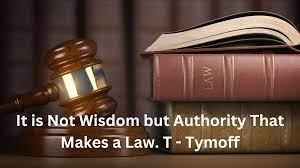Introduction:
In the realm of governance and societal order, the question of what constitutes the foundation of law has long been a subject of philosophical debate. One prominent assertion posits that “it is not wisdom but authority that makes a law.” This perspective challenges the conventional belief that laws should derive from wisdom, moral principles, or rational discourse. Instead, it emphasizes the role of authority as the primary force shaping legal frameworks. In this exploration, we delve into the implications of this statement, examining its historical context, philosophical underpinnings, and the potential consequences for society.
Historical Context:
The idea that authority, rather than wisdom, is the driving force behind law has deep historical roots. Throughout various epochs, rulers, monarchs, and governing bodies have exercised authority to establish and enforce laws. This authority often emanated from positions of power rather than an intrinsic understanding of the wisdom inherent in the laws themselves. The concept gained prominence in autocratic regimes, where the ruler’s decree was considered law, regardless of its ethical or rational foundation.
Philosophical Considerations:
Philosophers have grappled with the dichotomy between wisdom and authority in the context of law. The notion that authority supersedes wisdom challenges the ideals of natural law, which posits that laws should be based on universal principles discernible through reason. Thinkers such as Thomas Hobbes argued that a sovereign authority, even if not inherently wise, is essential to maintain order and prevent societal chaos. This perspective contends that the stability provided by authority is more critical than the intrinsic wisdom behind the laws themselves.
Potential Consequences:
Accepting the proposition that authority, not wisdom, is the driving force behind law raises important ethical and practical considerations. If laws are mere products of authority, divorced from moral or rational foundations, they may lack the legitimacy required for widespread acceptance. This can lead to a perception of injustice and a breakdown of societal cohesion. Additionally, an overreliance on authority may result in arbitrary rule, with those in power imposing laws to serve their interests rather than the common good.
Balancing Wisdom and Authority:
While the statement challenges the idealistic notion that laws should be grounded in wisdom, it does not necessarily dismiss the importance of wisdom in governance. A more nuanced approach suggests that a balance between wisdom and authority is crucial for the creation of just and effective laws. Wisdom, derived from ethical considerations, societal values, and rational discourse, can inform the authority’s decisions, providing a moral compass to guide the enactment and enforcement of laws.
Conclusion:
In contemplating the assertion that “it is not wisdom but authority that makes a law,” we navigate a complex interplay between historical precedent, philosophical thought, and the practical consequences of legal systems. While authority undoubtedly plays a role in lawmaking, a truly just and enduring legal framework requires a harmonious integration of wisdom, ethics, and societal values. Striking this delicate balance ensures that laws not only maintain order but also reflect the fundamental principles that bind communities together.
FAQs on “It is not wisdom but authority that makes a law” by Tymoff
1. What does the statement mean?
The statement suggests that the creation and enforcement of laws are primarily driven by authority, rather than being guided by wisdom, morality, or rational discourse. It implies that the power to establish laws is vested in those with authority, even if their decisions may lack inherent wisdom.
Also Read: WWE SmackDown Episode 1459: A Night of Thrills, Surprises, and Unforgettable Moments
2. Who is Tymoff, and what is the context of this statement?
Tymoff is not a known figure in the provided context. The statement is presented as a philosophical assertion, and the context may involve discussions on the origin and nature of laws, particularly whether they should be grounded in wisdom or established through authoritative power.
3. How does this perspective differ from traditional views on law?
Traditional views often emphasize the importance of wisdom, moral principles, and rational discourse in the formulation of laws. This perspective challenges that notion, suggesting that authority, irrespective of wisdom, is the primary force behind law.
4. Are there historical examples supporting this perspective?
Yes, throughout history, various rulers and governing bodies have enacted laws based on their authority, often without a clear moral or rational foundation. Autocratic regimes, in particular, have been known to rely on authoritative power to establish and enforce laws.
5. Does this mean that laws can be arbitrary and unjust?
The perspective raises concerns about the potential for arbitrary rule when laws are solely based on authority. Laws lacking a foundation in wisdom, ethics, or rational discourse may be perceived as unjust, leading to societal dissatisfaction and a breakdown of order.
6. Can wisdom and authority coexist in the creation of laws?
The perspective does not necessarily exclude the role of wisdom. A balanced approach suggests that both wisdom and authority are essential. Wisdom can inform the decisions of those in authority, ensuring that laws are not only enforceable but also just and reflective of societal values.
7. What are the implications for a society where authority prevails over wisdom in lawmaking?
Such a society may face challenges related to the legitimacy of laws. The potential for arbitrary rule and the absence of a moral or rational foundation may lead to a lack of trust in the legal system, potentially resulting in social unrest and dissatisfaction.
8. How can a balance between wisdom and authority be achieved in lawmaking?
Striking a balance involves incorporating wisdom derived from ethical considerations, societal values, and rational discourse into the decision-making process of those in authority. This ensures that laws are not only authoritative but also grounded in principles that contribute to societal well-being.
